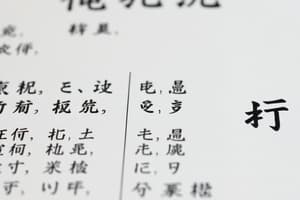Podcast
Questions and Answers
What does the phrase '挺...的' refer to in use?
What does the phrase '挺...的' refer to in use?
- To indicate a high price
- To be quite or pretty (correct)
- To swipe a card
- To express a need for assistance
In the context of shopping, what is the meaning of '稍等'?
In the context of shopping, what is the meaning of '稍等'?
- To ask for assistance
- To wait a moment (correct)
- To try on an item
- To check the price
Which action is associated with the verb '拿'?
Which action is associated with the verb '拿'?
- To try something on
- To take or hold something (correct)
- To help somebody
- To swipe a card
What does '别的' imply when used in a conversation?
What does '别的' imply when used in a conversation?
What does the phrase '还' add to a sentence?
What does the phrase '还' add to a sentence?
In the shopping context, why would someone want to '刷'?
In the shopping context, why would someone want to '刷'?
When Li Bai mentions, '有点儿贵', what is he expressing?
When Li Bai mentions, '有点儿贵', what is he expressing?
What is the primary function of the word '帮' in a sentence?
What is the primary function of the word '帮' in a sentence?
When someone uses '我想去卫生间', what are they expressing a desire for?
When someone uses '我想去卫生间', what are they expressing a desire for?
What does '银行卡' refer to?
What does '银行卡' refer to?
What is the meaning of the word '女' (nǚ)?
What is the meaning of the word '女' (nǚ)?
Which phrase indicates a size in the context of shoes?
Which phrase indicates a size in the context of shoes?
If someone asks '可以去一下洗手间吗?' (kěyǐ qù yīxià xǐshǒujiān ma?), what are they requesting?
If someone asks '可以去一下洗手间吗?' (kěyǐ qù yīxià xǐshǒujiān ma?), what are they requesting?
What does the verb '试' (shì) mean in this context?
What does the verb '试' (shì) mean in this context?
In the context of pricing, what does '元' (yuán) refer to?
In the context of pricing, what does '元' (yuán) refer to?
Which expression means 'can' in a context indicating permission?
Which expression means 'can' in a context indicating permission?
What is the meaning of '价' (jià)?
What is the meaning of '价' (jià)?
Which sentence uses '可以' (kěyǐ) correctly?
Which sentence uses '可以' (kěyǐ) correctly?
Which of the following expressions means 'to follow'?
Which of the following expressions means 'to follow'?
How is the verb '上' (shang) used in context?
How is the verb '上' (shang) used in context?
Which statement about the word '戴' is correct?
Which statement about the word '戴' is correct?
What does '合适' mean in the context provided?
What does '合适' mean in the context provided?
In which context can '还是' be used as 'had better'?
In which context can '还是' be used as 'had better'?
How is '着' used in a sentence?
How is '着' used in a sentence?
Which of the following describes '选' or '选择'?
Which of the following describes '选' or '选择'?
What does '常' or '常常' imply in a sentence?
What does '常' or '常常' imply in a sentence?
When indicating something that is too small, which phrase would be used?
When indicating something that is too small, which phrase would be used?
In the provided conversation, what suggestion does 米雪 give to 李白 regarding the watch?
In the provided conversation, what suggestion does 米雪 give to 李白 regarding the watch?
What does '让' express when used in a sentence?
What does '让' express when used in a sentence?
Which of the following best describes '常常' in sentences?
Which of the following best describes '常常' in sentences?
Study Notes
Lesson 4
-
Vocabulary
-
女 (nǚ): female
-
男 (nán): male
-
号 (hào): size
-
元 (yuán): yuan (Chinese currency)
-
价 (jià): price
-
这边 (zhèbian): here; this side
-
跟 (gēn): to follow
-
可以 (kěyǐ): may; can
-
试 (shì): to try
-
V 上 (shang): on (used after a verb or noun to indicate the action had a result or achieved its goal)
-
挺... 的 (tǐng... de): quite; pretty
-
帮 (bāng): to help
-
拿 (ná): to take
-
稍等 (shāoděng): wait a moment
-
别的 (biéde): other
-
还 (hái): in addition
-
刷 (shuā): to swipe
-
银行卡 (yínhángkǎ): bank card
-
-
Grammar
- "V+ 上 (shang)" is used after a verb or noun to indicate that the action had a result or achieved its goal.
- "挺... 的 (tǐng... de)" is used to express that something is quite or pretty good.
- "帮 (bāng)" is used to express helping someone.
- "拿 (ná)" is used to express taking something.
- "稍等 (shāoděng)" is used to express waiting a moment.
- "别的 (biéde)" is used to express something different or other.
- "还 (hái)" is used to express in addition to something else.
- "刷 (shuā)" is used to express swiping something, like a bank card.
- "银行卡 (yínhángkǎ)" is a bank card.
-
Dialogue 1:
- Li Bai wants to buy black leather shoes.
- He tries on a pair of shoes and likes them.
- He asks the price and thinks it is expensive.
- He doesn't have WeChat, but he can pay by bank card.
-
Dialogue 2:
- Mi Xue asks Li Bai if he bought the leather shoes.
- He tells her that he also wants to buy a watch.
- He shows Mi Xue two watches and asks for her opinion.
- Mi Xue recommends the first watch because Li Bai likes to exercise.
- Li Bai wants to wear the watch for his singing competition.
- Mi Xue recommends the second watch.
- Li Bai's roommate also recommends the second watch.
- But Li Bai thinks the second watch is too small.
- Mi Xue asks him to think it over.
-
Cultural Notes
- WeChat is a very popular messaging app in China. It can be used for many purposes, such as paying for goods and services.
- Banks cards are also used in China for many purposes. They are a convenient and common way to pay for things.
- It is considered impolite to refuse a gift in China. If someone offers you a gift, it is best to accept it politely, even if you do not want it.
Studying That Suits You
Use AI to generate personalized quizzes and flashcards to suit your learning preferences.
Related Documents
Description
This quiz focuses on Lesson 4 of Chinese vocabulary and grammar. Students will learn essential words related to size, currency, and common actions, as well as grammatical structures. Test your understanding of these terms and their uses in conversation.




